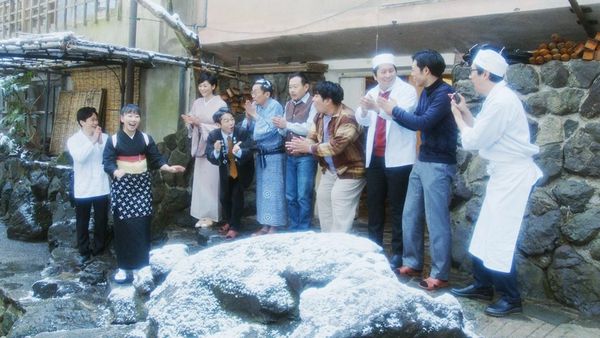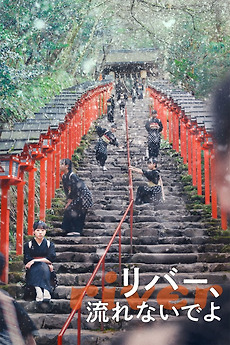Eye For Film >> Movies >> River (2023) Film Review
River
Reviewed by: Jennie Kermode

Osake-born Junta Yamaguchi burst onto the scene in 2021 with Beyond The Infinite Two Minutes, a high concept, low budget science fiction film which surprised everyone by remaining inventive throughout, and by packing an emotional punch on top of that. Now he’s back exploring similar themes, perhaps in the same universe, as the staff and residents of a small Kibune inn find themselves trapped in a time loop.
Time loops of any kind can be supremely irritating in films, and to keep viewers watching through a two minute one, repeated over and over again, takes real skill, but Yamaguchi has got that. He begins by getting the basics out of the way. The characters are smart enough to realise and accept what’s going on, even if it makes sense. They don’t waste time on denial or on doubting each other’s observations. It helps that they can’t have long conversations because every two minutes they find themselves back in their starting positions and, their memories intact, must hastily resemble if they are to make anything of it.

What is behind this phenomenon? Some characters are determined to figure it out, but because of the challenges of meeting up to exchange information, they’re not terribly well coordinated and we don’t follow their efforts in linear fashion. Others try to find out if it’s possible to escape, with various ingenious and sometimes dangerous approaches to the problem. When, early on, a couple of people start to get careless, they are warned by a chef with a passion for physics that they should be careful because the flow of time could resume at any moment, so they shouldn’t assume that they won’t have to live with the consequences of their actions. Meanwhile, two guests delight in eating and drinking as much as they like, getting neither bloated nor inebriated in the process.
There is, a little hesitantly, speculation as to whether or not this could make everyone there immortal. The inn’s managers are keen to see the staff do their jobs and look after the guests regardless, potentially committing themselves to indefinite work. The staff want to know what will happen about their breaks and how their pay will be calculated for this day. As other characters come and go, we follow maid Mikoto (Riko Fujitani), who finds herself increasingly isolated, wrapped up in feelings of guilt as, despite all the chaos it’s causing, she doesn’t really want this day to end. Facing the future is hard – and she’s not the only one who feels that way.
This is the heart of the film. Yamaguchi and his regular writer, Makoto Ueda, have such a deep understanding of their characters that it’s the emotional timeline, rather than the physical one, that becomes the subject of real concern. The broad comedy of their previous work is more tempered here, which is likely to make the fil more accessible to an international audience. It’s still very funny in places, but sweetness predominates from the early stages, the lonely Mikoko easily attracting sympathy and drawing viewers into her world, perhaps helping us all to remember times when we wished that things could remain just the way they are forever. In the end, though, you’ll be ready to move forwards, because you’ll be hoping that in due course you get to see this winning team’s next work.
Reviewed on: 11 Feb 2024
















